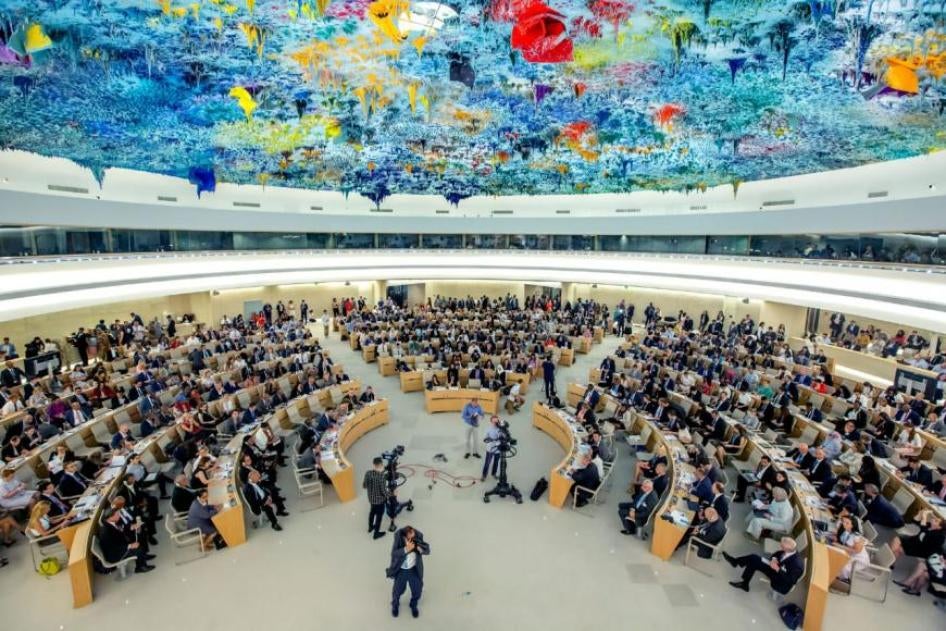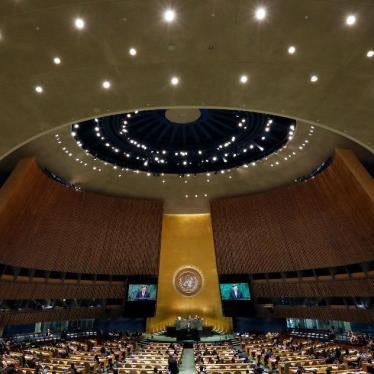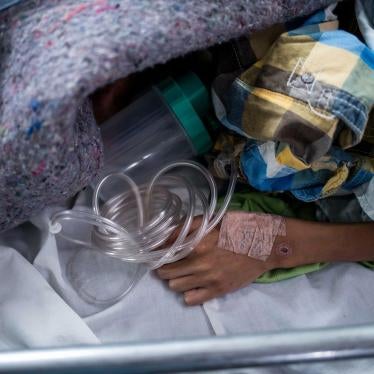Update: The UN Human Rights Council on October 7 renewed the mandate of the Independent International Fact-Finding Mission on Venezuela for two years.
(New York) – United Nations member countries voting in the upcoming Human Rights Council election should deny Venezuela a seat due to the government’s horrific rights record and possible crimes against humanity, Human Rights Watch said. Other candidates with appalling human rights records for seats on the UN’s premier human rights body include Afghanistan, and Vietnam.
The secret-ballot election will take place in the 193-member UN General Assembly on October 11, 2022. Seventeen countries are running for 14 spots on the 47-nation council for 2023-2025, with 3 of the 5 regional groups offering no competition on their slates. Noncompetitive regional slates hand candidates seats on the council whether or not they deserve them. Venezuela, which narrowly won a seat on the council in 2019, is among three candidates for two seats in the Latin America and Caribbean group, running against Chile and Costa Rica.
“Venezuela’s vengeful assault on critics of the government makes the country unfit for membership in the UN’s top rights body,” said Louis Charbonneau, UN director at Human Rights Watch. “Returning this abusive government to the council would undermine the UN’s credibility by rewarding Venezuelan authorities with a role in judging other countries’ human rights while they brutalize their population.”
Algeria, Morocco, South Africa, and Sudan are the candidates for four seats on Africa’s noncompetitive slate. The Western group is also without competition, with Belgium and Germany running for the region’s two spots. The Central and Eastern Europe group is also noncompetitive, with Georgia and Romania running unopposed.
The Asia group is the only other competitive slate. Six candidates, Afghanistan, Bangladesh, Kyrgyzstan, Maldives, South Korea, and Vietnam, are competing for four seats for the group.
The Nicolás Maduro government in Venezuela is continuing its crackdown on dissent. The country had 244 political prisoners as of September, by a local group’s count, many in detention centers run by the intelligence services, to which the UN rights office no longer has access. Detainees have faced electric shocks, waterboarding, sexual violence, and other torture.
Security forces killed at least 19,000 people between 2016-2019 in incidents largely officially recorded as “resistance to authorities,” a designation that in practice includes extrajudicial killings. The repression, and the ongoing humanitarian emergency, have forced over 6.8 million Venezuelans to flee their country – the largest migration crisis in the region and one of the most serious globally.
Since 2020, the UN Fact-Finding Mission to Venezuela has found evidence of serious human rights violations and crimes against humanity, including a direct role by prosecutors and judges in State repression. In November 2021, the International Criminal Court’s Office of the Prosecutor opened its first investigation on Latin America to examine allegations of international crimes committed in Venezuela. In September, the Fact-Finding Mission published a report detailing how the chain of command in the commission of these crimes by the intelligence services implicates Maduro himself. Human Rights Council member states, which are expected to vote in Geneva on whether to extend the mission, should renew its mandate so the mission can continue documenting abuses and ensure accountability.
UN General Assembly Resolution 60/251, which created the Human Rights Council, urges countries voting for members to “take into account the contribution of candidates to the promotion and protection of human rights.” Council members are required to “uphold the highest standards in the promotion and protection of human rights” at home and abroad and “fully cooperate with the council.”
In the Asia group, Vietnam has long had a poor human rights record. The one-party rule of the Communist Party of Vietnam systematically suppresses basic civil and political rights. Rights activists and bloggers critical of the government frequently face police harassment, arbitrary arrest, and imprisonment.
In Afghanistan, also on the Asia slate, the Taliban have imposed sweeping violations of the rights of women and girls, including to education, work, and freedom of movement, since taking power in August 2021. In Bangladesh, top law enforcement officials have been responsible for extrajudicial killings, enforced disappearances, and torture.
In the Africa group, authorities in Algeria have been arresting and imprisoning peaceful activists, human rights defenders, and journalists critical of the government. Moroccan authorities are using indirect and unlawful tactics to silence human rights activists and critical journalists. Sudan’s security forces have repeatedly used excessive and lethal force against peaceful protesters since the 2021 coup, killing at least 117 and injuring thousands.
Countries elected to the Human Rights Council should speak out and support strong action against human rights violations committed by allies as well as adversaries. They should join in confronting serious human rights problems around the world, including war crimes committed by Russian forces in Ukraine and by forces in Syria, Myanmar and Ethiopia, systemic repression in Egypt and North Korea, Israeli apartheid, and racial discrimination in the United States. In the wake of the devastating UN report on possible crimes against humanity by Chinese authorities targeting Turkic Muslims in the Xinjiang region, one of the council’s priorities in the coming months should be establishing a formal UN investigation.
“UN member states will soon have the opportunity to close the door on Venezuela’s return to the Human Rights Council,” Charbonneau said. “With the likes of China, Eritrea and Cuba already on the council, the UN rights body would benefit from having one fewer member who’s a walking advertisement for torture and other abuses, and impunity.”








